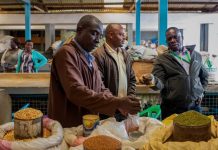Africa-Press – Uganda. As of today, anything that threatens the world does so Africa to multiple proportions. This is due to continent’s bottom position on the global economy profile. The red signals flashing before earth are thus most critical for Africa than any other jurisdiction.
It is up to us to live our lives as if these threats are not real, and thus leave future African populations endangered, or to act and halt the potential assault of these threats and secure the safety of our grandchildren and their children and many more generations to come.
By March 2021, some sources quote global Covid-19 deaths to stand at about 2.7million people. For contextualization, an equivalent of the population of the entire of a country such as Botswana has been wiped out since the pandemic struck.
Beyond the registered harm, the pandemic has also unlocked a fresh door into the future that may usher in challenges that those who come after us will grapple with – an aggravation of present day challenges as well as potential new ones, at a distressing scale.
In their 2021 global risks report, the World Economic Forum has highlighted emerging threats to the world, escalated by Covid-19. From this report, Africa can pick a few lessons against which to anticipate the future and work towards a better continent for our descendants.
As per the publication, in the next ten years, the world needs to look out for extreme weather, climate action failure and human-led environmental damage, digital power concentration, digital inequality, cyber-security failure, infectious diseases, weapons of mass destruction, livelihood crises, debt crises and IT infrastructure breakdown.
At a slightly more granular level, the threats above threats unwrap themselves as follows, for Africa:
Economic fragility and societal divisions are set to increase It has always been urgent, and yet elusive, that Africa must unite as one economic front, among other unification points.
On a positive note, economic integration agenda for the content is in infancy of its formalization, with the African Continental Free Trade Area having kicked off this year.
One of the ugly consequences of the Covid-19 pandemic is that countries will tend to be more intent about self preservation, and thus social cohesion is endangered. Protectionist tendencies have found fertile ground. Countries will tend to prepare themselves for instances of potential need to survive without others.
The agenda for Africa’s trade integration is thus threatened in its infancy, as a result of the coronavirus crisis.
Without this integration, the disenfranchisement of the future African is assured, and will have more acute consequences than our generation is facing since the rest of the world is also becoming more desperate to survive in the uncertainties of the future and may thus be more inclined to apply distasteful measures to achieve that.
A disillusioned youth population in an age of lost opportunity Many young adults are now entering the workforce in a period of what the World Economic Forum refers to as an employment ice age in their report.
The impact of the digital leap in recent years, made even more important by the coronavirus crisis and the emergence of more critical reliance on IT for work, is dampened by the massive loss of jobs and compromised livelihoods and the incapacity of employment offering by many corporations.
The financial crisis, rising inequality, disruption of industrial transformation, while applying to the whole world, pose greatest challenge for Africa. The continent has a youngest population whose expectations have already been a challenge. Now the problem is aggravated.
The potential dangers from a disillusioned youth population are now more critical, and they pose a threat today but more so for the future since these youths will transit into adulthood against a faulty foundation, with far reaching socio-economic and socio-economic ramifications than we possibly know of today.
Climate change mitigation is compromised While well resourced and with inherent capabilities to combat climate change, it is anticipated that Africa will face the brunt of climate change if not arrested.
This is because Africa has least capacity for required adaptability owing to poverty, infrastructure deficiencies and other related challenges. In addition to other climate change troubles, food security for Africa is most threatened.
Already, the continent depends on food imports in an unfortunate state of affairs since Africa has the greatest potential for agricultural productivity globally.
According to FAO projections, temperatures are likely to increase by between 1.5ºC to 4ºC in this century. Africa’s projections on agricultural yield reduction show a drop of up to 50 per cent and crop revenue is forecast to fall by as much as 90 per cent by 2100. On the other hand, the continent’s population is projected to triple by that year.
Imagine the dilemma our descendants are likely to find themselves in if nothing is done to stop or at least reduce the impact of climate change.
Raymond is a Chartered Risk Analyst and risk management [email protected]






